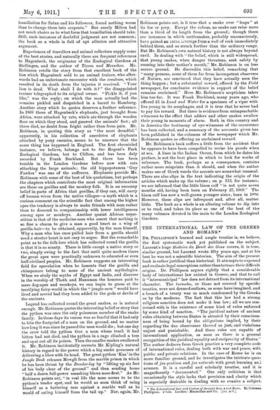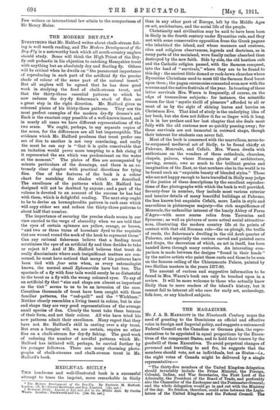THE INTERNATIONAL LAW OF THE GREEKS AND ROMANS.*
Du. PHILLIPSON'S learned and ample treatise is, we believe, the first systematic work yet published on the subject. Laurent's huge llistoire du Droll des Gene covers, it is true, similar ground, but Laurent wrote fifty years ago, and at his best he was not a scientific historian. The aim of the present book is rather juridical than historical. It attempts to expound and evaluate legal conceptions rather than to trace their difficult origins. Dr. Phillipson argues rightly that a considerable body of international law existed in Greece, and that to call it " intermunicipal " law does not detract from its international character. The rNecrovaol, or those not covered by specific treaties, were not deemed outlaws, as some have imagined, and a breach of a treaty was as much condemned by the Greeks as by the moderns. The fact that this law had a strong religious sanction does not make it less law; all we are con- cerned with is the existence of some kind of rules enforced by some kind of sanction. "The juridical nature of ancient rules obtaining between States is attested by their conscious- ness of being bound by the obligations implied, by their regarding the due observance thereof as just, and violations unjust and punishable. And these rules are capable of international application, as soon as there is a general recognition of the juridical equality and reciprocity of States." The author deduces from Greek practice a very complete code of international rules, dealing both with war and peace, with public and private relations. In the case of Rome he is on more familiar ground, and he investigates the intricate ques- tions of lets gentium and ins naturals with great learning an.1 acumen. It is a careful and scholarly treatise, and it is magnificently " documented." Our only criticism is that occasionally the style lacks that precision and clarity which is especially desirable in dealing with so evasive a subject.
• The Intsrnational Lair and Custom of Ancient Gree, and /tome. By Coleman Phillipson. 2 vole. London: Macmillan and Co. [tic net.]
Few writers on international law attain to the compactness of Sir Henry Maine.











































 Previous page
Previous page